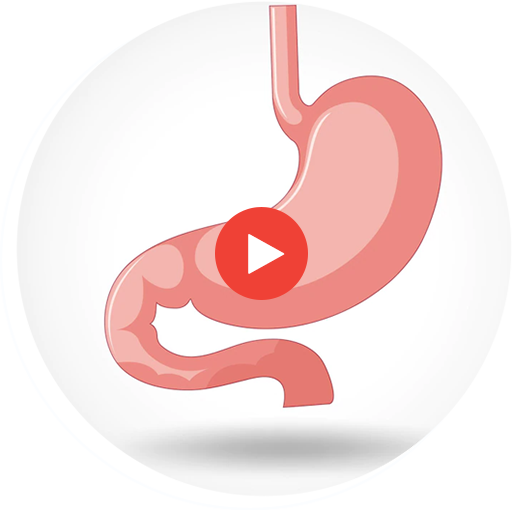
Consult an Online Doctor
For Acid Reflux
Book an Appointment for
Only 
TELMDCARE
What is
Acid Reflux?
In acid reflux, the muscle at the opening of the stomach, located between the esophagus and the stomach relaxes, letting stomach acid into the esophagus. The condition affects nearly 1 out of 5 people in the US. However, a consultation with an online doctor can help patients ease their acid reflux symptoms.
In some cases, the LES opens up more often than it should. This can enable the stomach acids to rise past the LES and into the lower esophagus. The lining of the tissue of the esophagus is irritated by the stomach acid, causing tissue damage.
The condition causes chronic inflammation to the esophagus which can result in other serious conditions. You may need medication or, in some cases, surgery for treatment.
TELMDCARE
Is covered by many popular
insurance plans

TELMDCARE
What Causes Acid Reflux?
The abnormal acid suspension may cause symptoms like heartburn, which presents as a burning sensation in the chest, causing discomfort. If these symptoms occur twice a week or more, it's diagnosed as Chronic Acid Reflux disease or gastroesophageal reflux disease (GERD).
TELMDCARE
Expired Medication
The best option to manage expired or unused medicine is to find a location that takes back drugs. This is a Food and Drug Administration-approved procedure to dispose of medication. Local hospitals and pharmacies are take-back locations. These facilities can accept an expired or unused prescription via in-home disposal, on-site medicine drop-off boxes or mail-back programs. If your prescription expires, you should dispose of it immediately for your safety and visit your doctor for a fresh one. Use a medication disposal box to dispose of your medication for safety. The protocol for medication disposed of in medication disposal boxes is to be incinerated. This way, they cannot get mixed up into the regular supply by accident or end up in the wrong hands to be sold illegally. You should remove the label from the bottle with your personal information on it for at-home disposal to maintain your privacy. Don't flush expired medication down the toilet as the local waterways can get contaminated. If you're unsure of the correct procedure for disposing of medication at home, you can call any pharmacist or our telemedicine doctor to guide you through the process. This can ensure that the medication is disposed of safely.

TELMEDCARE
What we treat
We treat a variety of acute and chronic conditions and provide expert medical advice and guidance for our patients.
Read More
How to Prevent
Symptoms of GERD?
Online doctors recommend some dietary and other lifestyle changes to ease acid reflux. These include:
During a migraine attack, you may feel:
Changes in Lifestyle
- Eat frequently but smaller meals daily
- Quit smoking
- Take naps only in a seated position
- Avoid wearing constricting clothing
- Avoid eating right before bed
- If you're obese, exercise and maintain a healthier diet to lose weight
Changes in Diet
Online doctors might suggest some dietary changes, including:
- Fried foods
- Spices foods
- Chocolates
- Alcohol
- Fatty foods such as dairy products
- Tomato sauces
- Coffee
- Garlic
- Citrus fruits
- Onions
- Sodas or carbonated drinks
Makes notes of the foods that cause you problems and find a doctor online for acid reflex.
What Are the Symptoms of
GERD
(Chronic Acid Reflux)?
The symptoms vary from person to person but they commonly present as:
GERD Symptoms in Infants and Children:

Occasional Symptoms of Acid Reflux
How Common Is GERD?
GERD and Acid reflux affect roughly 20% of people in the U.S. People of all ages can suffer from GERD, but some people are at a higher risk than others, such as:
Treatment and Medication
If you're suffering from acid reflux or heartburn for a number of weeks, twice a week or more, you should make an appointment online to consult a virtual doctor. In some cases, despite taking acid reflux medication like antacids, the symptoms may come back. It's recommended that you get an online doctor's consultation immediately. At TelMDCare, patients can get in touch with our telemedicine doctors and seek medical help for Acid Reflux.
TELMDCARE
As Seen On

TELMDCARE
Sign Up
Our best online doctors on call ensure that the services we provide are adequate, high quality,
and affordable.
Get in touch with us today for more details or Sign Up for a quick consultation.
$43 SIGN UP
TELMDCARE
Common FAQs for Acid Reflux
Although heartburn can make you feel like you're experiencing a heart attack, its symptoms are different from those of a heart attack. Since the discomfort is in your chest, it can be hard to tell the difference between heartburn and a heart attack. A heart attack can cause pain in the arms, jaw, and neck. It can also trigger nausea, dizziness, sweating, and fatigue. Some of the other symptoms of a heart attack include shortness of breath, dizziness, sweating, and extreme fatigue. If you're experiencing these symptoms and are not able to control your heartburn, you should immediately call for medical attention. 2. Can GERD (chronic acid reflux) cause asthma?
Although it's not clear exactly how GERD and asthma affect each other, it's widely believed that people with asthma are more prone to having GERD than those without the condition. GERD's symptoms can cause damage to the lining of the airways and throat, making it hard to breathe. It can also trigger a cough, which may be a sign of a link between asthma and GERD. Doctors mainly consider GERD as a cause of asthma if it starts in adulthood. Asthma attacks worsen after exercising, eating, or lying down. Your virtual doctor for acid reflux can help you find the best treatment for GERD. These conditions can be treated using the appropriate medications and procedures.
Although GERD isn't life-threatening, long-term exposure can lead to more serious ailments. One of these is esophagitis, which is an inflammation and irritation of the lining of the esophagus. It can cause ulcers and other health problems. About 10% of people with long-term GERD also have a condition known as Barrett's esophagus. This condition can lead to cancer. Acid reflux can damage the lining of the esophagus, which can cause changes. The type of cancer that starts in the esophagus can be divided into two types. Adenocarcinomas usually appear in the lower part of the body, while squamous cell carcinoma starts in the cells that line the organ. This type of cancer usually affects the middle and upper portions of the esophagus. When the damaged portion of the esophagus becomes scarred, it can narrow the esophagus, which can prevent food and liquids from going to the stomach.
Your doctor can usually tell you if you have simple acid reflux by asking about your medical history and symptoms. They can also discuss how you can manage your condition through diet and medication. If your symptoms don't improve, your doctor may suggest that you have a GERD test. A gastrointestinal (GI) endoscopy is a type of procedure that's usually performed through your mouth and throat. During this procedure, the doctor uses a long tube to check the lining of the upper GI tract. They then cut out a small portion of tissue to examine for other conditions. The upper GI tract is examined using X-rays, which can show any issues related to GERD. After the X-ray tech takes a picture, you drink a liquid that's moving through the area. The two types of tests that are used during this procedure are the Esophageal pH and the Bravo wireless system. The first one measures the pH level of your esophagus. After the doctor has inserted a tube into your mouth or nose, you'll be sent home with a monitor that records your condition. Manometry is a test that's used to check the function of the lower esophagus muscles and sphincter. Through a flexible tube, the doctor can determine the strength of the muscles and sphincter as you swallow.
Although GERD can be treated on an outpatient basis, a child or infant may need to be hospitalized if they have other conditions. Some of these include failure to thrive, poor weight gain, choking spells, and cyanosis, which is a type of discoloration of the skin caused by insufficient oxygenation.
Over-the-counter medications can help relieve GERD symptoms. However, some of these drugs come in prescription strength. If you're still not getting relief from these medications, your doctor may give you a prescription for stronger ones. Some of the most common medications used to treat GERD are antacids, which are designed to reduce stomach acid production. H-2 receptor antagonists, which are also used to decrease acid production, include Pepcid AC, Axid AR, and Zantac. Proton pump inhibitors, which are used to treat damaged esophagus tissue, include Prevacid, Prilosec, Zegerid, AcipHex, and Dexilant. One of the most common prescription drugs used to treat GERD is Baclofen. It works by reducing the relaxation of the lower esophagus sphincter.



